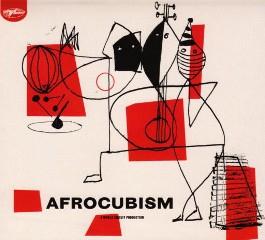Afrocubism - Afrocubism (2010)
Afrocubism - Afrocubism (2010)

1 Mali Cuba 5:38 2 Al Viavén De Mi Carreta 5:00 3 Karamo 6:56 4 Djelimady Rumba 3:11 5 La Culebra 3:34 6 Jarabi 5:57 7 Eliades Tumbao 27 1:17 8 Dakan 2:15 9 Nima Diyala 3:36 10 A La Luna Yo Me Voy 4:00 11 Mariama 4:00 12 Para Los Pinares Se Va Montoro 4:14 13 Benséma 4:58 14 Guantamera 4:05 Balafon – Lasana Diabaté Bass – José Ángel Martínez Congas, Bongos, Cowbell – Jorge Maturell Electric Guitar – Djelimady Tounkara Kora – Toumani Diabaté Maracas, Guiro, Chorus – Eglis Ochoa Performer – Grupo Patria Talking Drum – Baba Sissoko Trumpet – Alain A. Dragoni, Lennis Lara Violin – Gabriel Fonseca Vocals – Kasse Mady Diabaté Vocals, Electric Guitar – Eliades Ochoa Xalam [Ngoni] – Bassekou Kouyate
AfroCubism has been a widely acclaimed album released in 2010 through the World Circuit/nonesuch label. The fourteen songs of AfroCubism can be regarded as the result of a successful fusion of both Cuban and West African (predominantly Malian) music styles.
At first planned to be recorded and released in 1996, the label World Circuit had to postpone the original AfroCubism project and replaced it with the Buena Vista Social Club project. As we know, Buena Vista ended up being a global sensation, giving Cuban music instant exposure to a new global audience. The project was eventually resurrected fourteen years later and brought together highly experienced and talented musicians from Mali and Cuba.
African Kora (a twenty one string African harp) legend Toumani Diabaté teamed up with an African all-star setup composed among others of veteran Griot singer Kassé-Mady Diabaté, Bassekou Kouyaté (Ngoni -a nine string harp) , Djelimady Kouyaté (Soukous guitar -a particular chord picking technique) and Lassana Diabaté who plays an African style xylophone called Balafon.
The Cuban side was composed of lead vocalist Eliades Ochoa playing the Tres (a special type of guitar in Cuba) with his band El Grupo Patria contributing to the songs with maracas, guitar, double bass, and a horn section. Instantly recognizable with his cowboy hat and black outfits, Eliades Ochoa is a household name in Cuban Guajira music and was also part of the Buena Vista project in 1996 with the likes of Compay Segundo and Ibrahim Ferrer. Toumani Diabaté, Bassekou Kouyaté, Eliades Ochoa (Buena Vista Social Club)
While working on AfroCubism, musicians from both sides had to find a common ground. Not only were there language barriers between the two sides but also the music cultures were very different. Kora player Toumani Diabaté explains: “Another fact of this project, we really couldn’t speak together, but we have the international language of the music. Because the musical notes F and G in Toronto are the same in Mali, in Cuba, in Sydney, in Paris. This music has created its own language.”
The result is astonishing as the song arrangements AfroCubism are extremely well balanced and thought through.
Mali Cuba is the opening song of AfroCubism and mostly develops within a Guajira-Son framework, a musical style that mixes the traditional Cuban country music (Guajira means country in Spanish) with another style called El Son that was developed during the first decades of the 20th Century out of a mix of Spanish Rumba and musical instruments brought by the descendants of African slaves.
The song is structured with predominantly a Cuban instrumentation that mixes some Malian elements in it. The interesting part is how subtly these elements are disseminated throughout the song and the unique mix it creates. As the song develops, at some point the Malian instrumentation takes the lead providing vivid African colors to Mali Cuba while the Cuban instrumentation is temporarily relegated to the background.
The song starts with the heavy stomp of a double bass and with Maracas quickly joined by a crystalline Tres guitar accompanied by the melodic rhythm of Balafon percussions and the happy sound of a Kora. The tempo is falsely slow, highly dynamic and ultimately creates a groove that will make your hip wiggle.
Jarabi is a traditional Malian song that gets here an interesting treatment. The song is and remains a West African classic in its instrumentation, melodies and changing rhythms, yet it is sprinkled with Cuban elements that enhance its beauty without altering its original power. In this case the DNA of the song is African and the Cuban elements are discrete but effective adds-on.
It starts off with a few notes of Cuban guitar and continues on an African beat as Kasse-Mady Diabaté, the master Griot sings us the story of Jarabi. The studio version is relatively light on Cuban elements, yet Jarabi played live receives a different treatment with Eliades Ochoa playing several guitar solo and the members of El Grupo Patria making full use of the horn section. ---medium.com
download (mp3 @320 kbs):
yandex mediafire ulozto gett bayfiles








